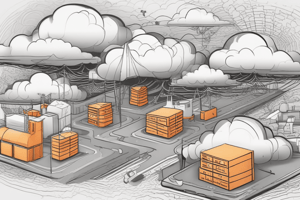Podcast
Questions and Answers
Which AWS service provides secure, resizable compute capacity in the cloud?
Which AWS service provides secure, resizable compute capacity in the cloud?
- Amazon Lambda
- Amazon EC2 (correct)
- Amazon Virtual Private Cloud (VPC)
- Amazon Simple Storage Service (S3)
Which AWS service is specifically designed for data backup, disaster recovery, and archiving?
Which AWS service is specifically designed for data backup, disaster recovery, and archiving?
- Amazon EC2
- Amazon RDS
- Amazon Simple Storage Service (S3) (correct)
- Amazon Lambda
Which AWS service makes it easy to set up, operate, and scale relational databases in the cloud?
Which AWS service makes it easy to set up, operate, and scale relational databases in the cloud?
- Amazon Relational Database Service (RDS) (correct)
- Amazon EC2
- Amazon Virtual Private Cloud (VPC)
- Amazon Simple Storage Service (S3)
Which AWS service offers varied cost and performance options through storage classes like Standard, IA, and Glacier?
Which AWS service offers varied cost and performance options through storage classes like Standard, IA, and Glacier?
Which AWS service allows users to launch applications like web servers and databases requiring high-performance computing resources?
Which AWS service allows users to launch applications like web servers and databases requiring high-performance computing resources?
What is the main advantage of using Amazon Lambda?
What is the main advantage of using Amazon Lambda?
How can a Lambda function in a different VPC access an RDS instance?
How can a Lambda function in a different VPC access an RDS instance?
What is the recommended practice when deploying an RDS instance in isolated subnets within a VPC?
What is the recommended practice when deploying an RDS instance in isolated subnets within a VPC?
Which AWS service allows you to launch resources in a virtual network you define?
Which AWS service allows you to launch resources in a virtual network you define?
What should be done if a Lambda function connected to an RDS instance needs internet access?
What should be done if a Lambda function connected to an RDS instance needs internet access?
Flashcards are hidden until you start studying
Study Notes
AWS Services: EC2, S3, RDS, VPC, Lambda
Amazon Web Services (AWS) offers a comprehensive suite of cloud services to support a broad range of IT infrastructures. In this article, we'll delve into five of AWS's most popular services: Elastic Compute Cloud (EC2), Amazon Simple Storage Service (S3), Amazon Relational Database Service (RDS), Amazon Virtual Private Cloud (VPC), and Amazon Lambda.
Elastic Compute Cloud (EC2)
EC2 is a web service that provides secure, resizable compute capacity in the cloud. You can pay by the hour or second for as many or as few Amazon Elastic Compute Cloud (EC2) instances as you need. EC2 instances can be launched to run applications like web servers, databases, or other applications that require high-performance computing resources.
Amazon Simple Storage Service (S3)
S3 is an object storage service designed to meet the needs of a wide range of use cases, such as data backup, disaster recovery, and archiving. S3 provides high durability and high-speed data access. S3's storage classes, like Standard, IA (Infrequent Access), and Glacier, offer varied cost and performance options to optimize storage for specific use cases.
Amazon Relational Database Service (RDS)
RDS is a managed service that makes it easy to set up, operate, and scale relational databases in the cloud. RDS supports several database engines, including MySQL, PostgreSQL, and Oracle. RDS manages time-consuming database administration tasks, freeing developers to focus on their applications.
Amazon Virtual Private Cloud (VPC)
VPC lets you provision a logically isolated section of the AWS cloud where you can launch AWS resources in a virtual network that you define. You have complete control over your virtual networking environment, including selection of your own IP address range, creation of subnets, and configuration of route tables and network gateways.
Amazon Lambda
Lambda allows you to run code without provisioning or managing servers. Lambda automatically scales your code to match traffic, which reduces your operational costs. Lambda integrates with other AWS services, such as Amazon S3 and Amazon DynamoDB, to enable various use cases like app backends, data processing, and real-time stream processing.
Connecting Lambda to Other AWS Services
To connect a Lambda function to an AWS service, such as S3 or RDS, you must configure the necessary networking settings. When connecting a Lambda function to an RDS instance in the same VPC, you set up inbound and outbound rules at the security group level. If the Lambda function and RDS instance are in different VPCs, you use VPC peering or AWS PrivateLink to connect the resources.
A Lambda function connected to an RDS instance cannot directly access the internet. If the Lambda function requires access to the internet, you must route internet-bound traffic to a NAT gateway in a public subnet.
Best Practices
When deploying an RDS instance into isolated subnets within a VPC, it's recommended to use VPC peering or AWS PrivateLink to connect the RDS instance to a Lambda function in a different VPC. Keeping the RDS instance in a VPC is a best practice for security reasons, as public databases should use NoSQL services like DynamoDB.
Conclusion
AWS's diverse suite of services, including EC2, S3, RDS, VPC, and Lambda, provides developers with powerful tools to build and scale applications in the cloud. Each service offers unique advantages, such as high-performance computing, cost-effective storage, and serverless computing. By understanding how to connect AWS services, developers can create efficient and secure architectures that meet their needs.
Studying That Suits You
Use AI to generate personalized quizzes and flashcards to suit your learning preferences.




